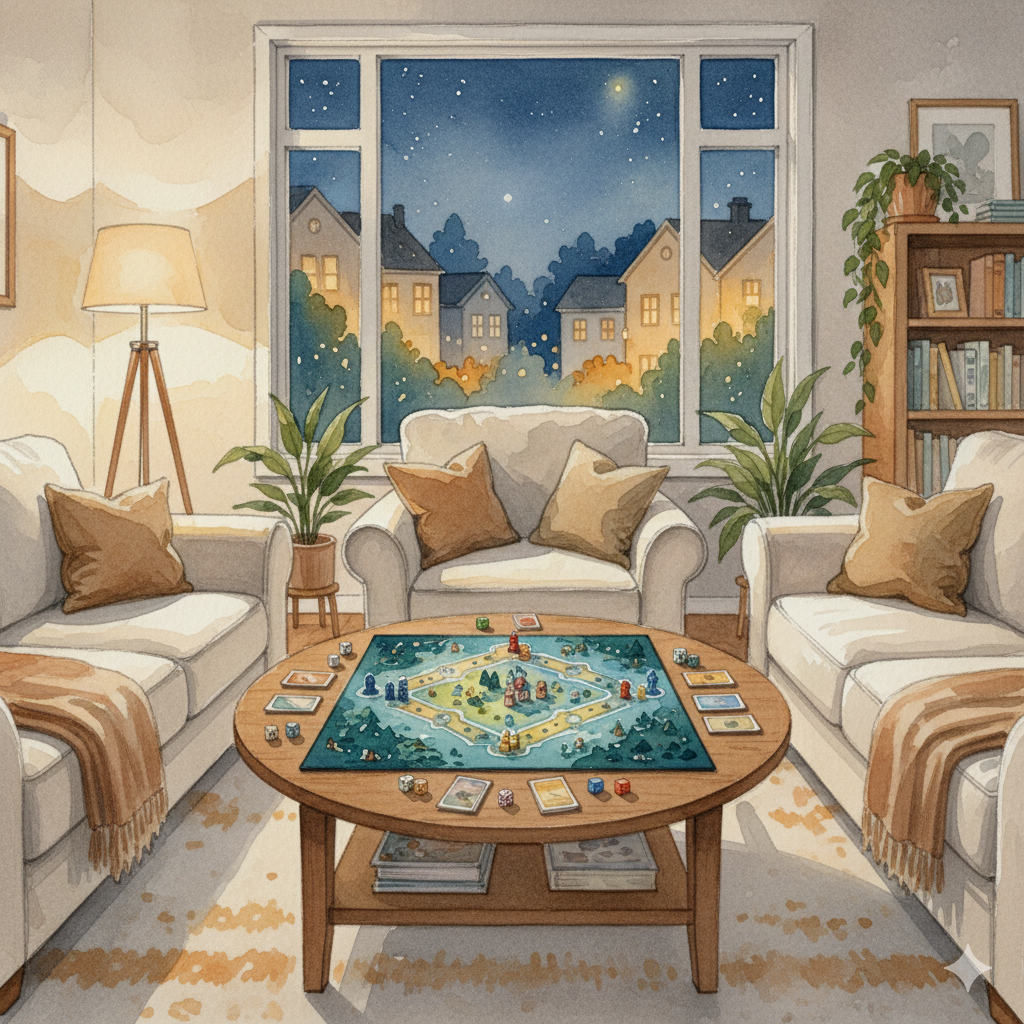How to Play
Last week, we hosted a games night in Lisbon. Friends were arriving, drinks were being poured, my partner was in the kitchen making dinner. And I was at my screen.
Not just physically at my screen, but trapped in it. The day's to-do list had grown tentacles. Each completed task had spawned two more. Emails marked urgent that weren't. Decisions that felt critical but probably weren't. The peculiar gravity of the laptop that pulls you in even when you know better.
It wasn't until thirty minutes after everyone had arrived that I finally entered the room. My body had been in the apartment the whole time, of course. But I hadn't been. There's a difference between being present and being there, and everyone knew which one I was.
I sat down at the table, still carrying the day with me like an invisible backpack. Someone was explaining the rules to a game. Cards were being passed around. And then something shifted.
Maybe it was the weight of the cards in my hand. Physical. Real. Simple. Our bodies know things our minds forget, that presence often begins in the palms.
I made my move. A choice that mattered not at all, and in that absence of consequence, something loosened. My shoulders dropped. My voice got louder. I could feel myself taking off the day like a coat I hadn't realized I was still wearing.
I've known some of these people for years. But watching them play, I saw something I hadn't seen before. Not different expressions, something underneath. The venture capitalist who couldn't decide whether to trade or not. The designer who became ruthlessly strategic the moment the cards were dealt. The quiet friend who turned into a theatrical bluffer. People becoming more themselves, not less.
There's something about games that reveals us. Not our professional selves, not our LinkedIn selves, and not our dinner party selves. But something earlier. Something we were before we learned to be who we are.
I watched my own competitiveness emerge. The intensity with which I planned three moves ahead. The genuine disappointment when my strategy collapsed. The surprising joy in caring about something that didn't matter at all.
Games are also the great equaliser. We live in hierarchies all day. Who reports to whom. Who gets heard in meetings. Who makes the decisions. But here, around this table, the dice don't care about your title. The cards don't know your salary. Your move is your move.
I've noticed how some of my friends have started reading strategy guides for board games. Optimization creeping in even here. The inability to just play badly. But then someone makes a ridiculous move, everyone laughs, and we remember: the point isn't to play well. The point is to play.
Somewhere during the second round, I noticed something. No one had checked their phone in over an hour. Not because we'd agreed not to. Not because of some digital detox pact. But because we were engaged in something that created its own temporal reality.
Turn-based time. "Your move" as a unit of measurement.
The focus that emerged wasn't the grinding focus of work. Not the heavy attention of deadlines and deliverables. This was something lighter. Attention without tension. The kind of focus that energises rather than depletes.
Hours passed without anyone noticing. Games as time machines, not taking us backward, but removing us from time altogether. When was the last time three hours disappeared without screens, without content, without consumption? Just humans, around a table, moving pieces.
I used to think growing up meant putting away childish things. Now I wonder if growing up means learning to pretend we don't need to play.
We perform adulthood so continuously, so convincingly, that we forget it's a performance. The serious meetings. The important decisions. The urgent everything. We've gotten so good at the role that we've forgotten we're playing it.
But games interrupt the performance. They don't ask you to be professional or productive or even particularly adult. They just ask you to play.
As the evening wound down and people started leaving, I felt different. Lighter. The day's earlier urgencies were still there, but they seemed properly sized now. The to-do list that had felt existential at 6 PM looked almost quaint at midnight.
My partner was cleaning up the kitchen. I picked up the dice, the cards, the pieces. Such simple objects. But they had done something profound. They had returned us to ourselves. Not our child selves, but our playing selves. The selves that know how to be present without trying, how to compete without consequence, how to care without weight.
Maybe that's what we lose when we forget how to play. Not innocence or simplicity, but a kind of fundamental presence. The ability to be fully in something that doesn't matter, which might be practice for being fully in things that do.
The next morning, I opened my laptop to the same urgent emails, the same growing to-do list. But something was different. I had remembered something I'd forgotten I'd forgotten: I know how to play.
And that is how I learned to play.




